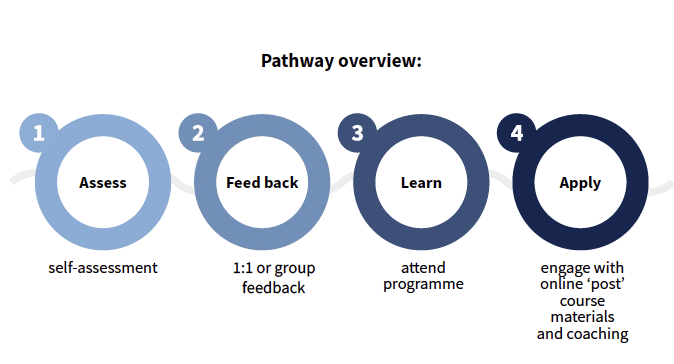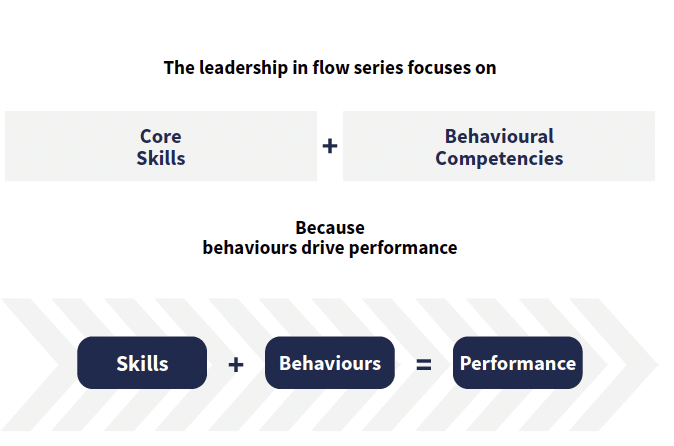As organisations increasingly call for employees to return to the office, the emphasis on high-performance leadership has taken on new urgency. Leaders must now navigate renewed expectations for in-office collaboration while driving productivity, engagement, and resilience within their teams. The shift underscores a critical gap: technical skills alone are insufficient for leaders tasked with meeting these demands. Instead, behavioural competencies, emotional regulation, adaptability, and motivational insight, play a central role in lifting not only individual performance but also the organisation’s overall output.
high-performance leadership has taken on new urgency. Leaders must now navigate renewed expectations for in-office collaboration while driving productivity, engagement, and resilience within their teams. The shift underscores a critical gap: technical skills alone are insufficient for leaders tasked with meeting these demands. Instead, behavioural competencies, emotional regulation, adaptability, and motivational insight, play a central role in lifting not only individual performance but also the organisation’s overall output.
The Limitation of Technical Skills in Today’s Workplace
Traditional leadership development often emphasises hard skills, which, while essential, do not fully equip leaders to manage today’s dynamic workplace. Research has long shown that technical expertise contributes only a fraction to job success; a significant majority stems from behavioural skills (Harvard Business Review, 2012). In an in-office setting, where daily interactions, team dynamics, and adaptive problem-solving are key, leaders who can regulate emotions, show resilience, and foster motivation make a far greater impact than those reliant solely on technical know-how.
The Core Behavioural Competencies Needed to Drive Organisational Performance
Behavioural competencies, when optimally used, enhance a leader’s ability to address the multifaceted needs of their teams, fostering a culture of productivity and engagement that lifts organisational performance. flowprofiler® assessments highlight several core behavioural traits that drive this shift:
- Emotional Regulation: In an office environment, leaders encounter various interpersonal situations that require composure and clarity. Emotional regulation allows leaders to model calmness and make balanced decisions, fostering a stable and focused team atmosphere. High emotional regulation also improves team morale, setting a foundation for performance in high-stakes settings (Goleman, 2004).
- Resilience: As organisations return to in-office structures, resilience helps leaders and teams alike adapt to change. flowprofiler® recognises resilience as a critical trait, enabling leaders to persevere and model optimism even during organisational transitions, creating an environment where setbacks are managed constructively.
- Motivational Insight: Understanding what drives individual team members is crucial for in-office leadership. By aligning organisational goals with employees’ intrinsic motivators, leaders create a culture of engagement and productivity. flowprofiler® enables leaders to identify these drivers, leading to a more motivated workforce and, by extension, a more agile and effective organisation.
- Adaptability: Organisational needs evolve quickly, particularly as they adjust back to traditional work environments. Adaptability allows leaders to flex their approach, tailoring strategies to team dynamics and company objectives. flowprofiler® assessments support leaders in harnessing this adaptability, enabling them to pivot and lead effectively in varied contexts.
Together, these behavioural traits foster a performance-driven workplace where employees feel engaged and aligned with organisational goals, ultimately lifting productivity across the board.
How flowprofiler® Empowers Leaders and Drives Organisational Success
flowprofiler® offers a unique approach to developing these competencies by helping leaders understand their behavioural profiles and use their traits in a balanced, proportional way. Unlike traditional models that categorise behaviours as static, flowprofiler® champions a dynamic view, assessing when leaders may be overusing or underusing certain traits. This calibrated approach equips leaders to adjust their behaviours according to team needs and situational demands, ensuring a steady and effective leadership style that promotes a resilient, high-performing organisational culture.
For example, a leader who can balance assertiveness with empathy is better positioned to communicate clearly while remaining approachable. This balance fosters a supportive team environment where employees feel both guided and valued, essential for in-office success.
❝In the world of leadership, the only thing you can truly
control is your behaviour.Master that, and you’ve mastered the essence of leadership in flow.❞
– flowprofiler®
Introducing the Leadership in Flow Development Journey
As organisations recognise the need for behavioural competencies in leadership, flowprofiler®’s Leadership in Flow series provides a targeted leadership development pathway to cultivate these essential traits. This series offers over 40 workshops, allowing organisations to create customised leadership programmes aligned with their strategic goals. At the core of this journey is the understanding that behaviours drive performance.
The Leadership in Flow pathway consists of four phases:
- Assess: Leaders begin with a self-assessment, using one of flowprofiler®’s specialised behavioural assessments to identify strengths and growth areas. This foundation helps tailor the development journey to each leader, ensuring that the programme aligns with both individual and organisational needs.
- Feedback: Through one-on-one or group feedback sessions, leaders gain insight into their behavioural competencies. This feedback stage reinforces self-awareness and builds a foundation for accountability, a critical factor in lifting organisational performance.
- Learn: Leaders then attend custom-designed workshops that address the core skills and behaviours required for high-performance leadership. flowprofiler®’s workshops focus on actionable outcomes, providing leaders with the tools to refine their competencies in emotional regulation, resilience, adaptability, and motivation.
- Apply: Following the workshops, leaders engage with post-course materials and coaching sessions, solidifying their learning and applying it within the organisational context. This ongoing engagement supports sustained behavioural change, ensuring that leaders can translate their development into improved team dynamics and productivity.

By incorporating this Leadership in Flow pathway, organisations not only empower leaders to improve their individual performance but also enhance overall organisational effectiveness. When leaders are equipped to adapt their behaviours strategically, they foster an environment where teams can thrive, leading to tangible gains in productivity, engagement, and retention.
The Organisational Impact of Behaviourally Competent Leaders
flowprofiler® assessments don’t just enhance individual leadership development; they create ripple effects throughout the organisation. Leaders who effectively regulate their emotions, motivate their teams, and adapt to challenges help create a culture of trust and engagement. This approach leads to:
- Higher Productivity: Teams that are motivated and well-supported show greater productivity, benefiting from leaders who understand their behavioural strengths.
- Improved Retention: Engaged employees are more likely to remain loyal to the organisation, reducing turnover costs and retaining critical talent.
- Enhanced Collaboration: With leaders fostering inclusive, open communication, teams work more cohesively, leading to better project outcomes and organisational success.
By investing in behavioural competency leadership development, organisations can ensure their leaders are equipped to elevate not only individual but collective performance, creating a competitive edge in the return-to-office era.
Behavioural Competency is a Strategic Imperative
Organisations need leaders who can balance technical expertise with the behavioural competencies required to manage in-office dynamics effectively. flowprofiler® bridges this gap by providing leaders with insights into their behavioural strengths and areas for growth, fostering a workplace culture that values adaptability, resilience, and motivational insight.

As the demand for high-performance leadership continues to grow, investing in behavioural assessments like flowprofiler® is a strategic move for organisations seeking long-term success. By cultivating leaders who are not only technically proficient but also behaviourally adept, organisations can enhance productivity, foster a resilient workplace, and drive sustainable growth.
References
- Goleman, D. (2004). Emotional Intelligence: Why It Can Matter More Than IQ. Bantam.
- Harvard Business Review. (2012). Technical Skills vs. Soft Skills: The 85% Factor.
- flowprofiler®. (2024). Flowprofiler Solutions for Behavioural Competencies. flowprofiler.com



